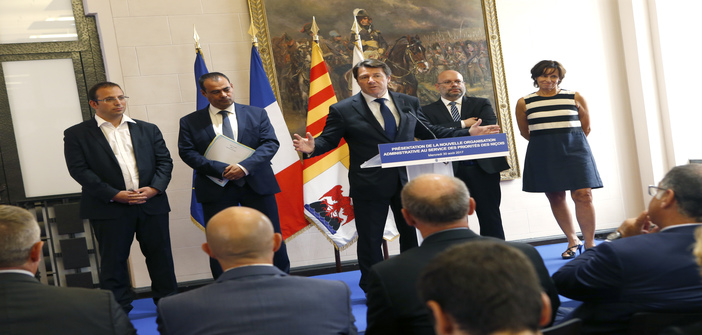After the appointment before the holidays of Lauriano Azinheirinha to the position of General Director of Services, replacing Prefect Drévet, Christian Estrosi announced yesterday a new organizational chart and reshaped the structure of the municipal machine.
The Mayor of Nice, surrounded by his close associates, first deputy Philippe Pradal, chief of staff Anthony Borré, and Lauriano Azinheirihna (shall we imagine that it moved from a tandem to a quartet?), explained his changes and provided the reasons for them at a press briefing in front of a handful of elected officials and administrative staff.
New changes are anticipated after the senatorial elections: Dominique Estrosi-Sassone, a pillar of municipal politics, will have to relinquish her delegations due to the accumulation of mandates. Who will have the heavy task of replacing this public administrator (with a stiff character) whose competencies are unanimously recognized? The (verbal) exchanges with the socialist opponent Paul Cuturello were one of the highlights of public sessions and added spice to the otherwise often soporific conformism. A pamphlet could gather the most “cutting”… an idea for Paul Cuturello?
These organizational changes and appointments occur mid-term and prepare for an electoral campaign for the municipal elections in 2020: will it be the (politically) deadly challenge between Christian Estrosi and his former right-hand man Eric Ciotti as well-informed sources claim? No one knows yet but… forewarned is forearmed.
Regarding the implementation of these administrative decisions, four centers will refocus the administration. These centers correspond to the four priorities that constitute the roadmap for the next three years:
- Proximity
- Security
- Development and beautification of our territory
- Enhancement of legal and financial security
The strengthening of the Proximity DGA, a strong focus of this second term, is a response to the proximity conventions held last spring.
It will encompass collection and cleanliness in order to further enhance the efficiency and responsiveness of these services (which, given the current state of affairs, will not be a luxury!) as well as services to the population, entertainment, and community life.
The creation of a (mega) Security DGA will obviously attach the Municipal Police, an units exclusively responsible for securing events, and all the services working on regulations and their implementation, such as road control services, public domain occupation, hygiene control, and establishments open to the public; green spaces.
Moreover, the Directorate of Risk Prevention and Management, the Victims’ Assistance House, whose leadership will be entrusted in a few weeks to a high magistrate, and green spaces.
The DGA will be Thierry AUBEL, current DGA within the Metropole, a former military officer; the Director of Security, police commander Richard GIANOTTI; the Director of Regulation and Control of Public Spaces, another high magistrate (name pending CNM approval); for event security: a former GIPN-RAID member, Serge POPOFF.
Regarding the continuation of major development and beautification projects, a single DGA will encompass: sustainable development, networks including sanitation, infrastructures, subdivisions, and Buildings.
Finally, to strengthen legal and financial security, a Legal Affairs, Assemblies, and Public Contracts DGA is created while a magistrate will head the General Inspection of services.
The Directorate of Real Estate and Patrimonial Resources is attached to the Finance DGA to achieve operational savings through optimizing locations, general resources, and especially increasing revenues by better valuing real estate and land assets.
Furthermore, a new Culture DGA, André Santelli, will take office in October.
The DGAs of Culture, Family, Sports and Education, Human Resources and Information Systems, and Economy are not directly impacted by this reorganization.
This little revolution demonstrates Christian Estrosi’s vision to give “his” city the status of a city-state with the conviction that the economic and social future will revolve more around metropolitan territories or regions than at the national state level. In this sense, he is right.
Hence, city-states must be organized according to international standards to make them attractive and armed in increasingly global competition.
The efficiency of public management becomes a significant asset in this context.
With all these high-ranking officials, high magistrates, and military/police officers, the residents of Nice will be well served; everything can function autonomously, by the rules, and… beware of the dissenters!
Nice could thus (symbolically) resemble the city-states of the Holy Roman Empire, and its mayor akin to an elector prince… a notion not fictional during the recent presidential campaign where he heavily supported Emmanuel Macron.
More prosaically, the battle for the 2020 municipal elections can commence; the citadel will not be easy to conquer.


